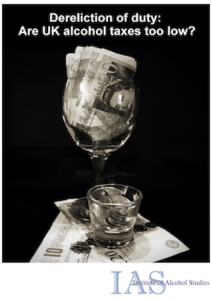View this report

There are three standard reasons why governments tax alcohol:
- Externality Correction: to ensure that alcohol prices reflect the cost to third parties who are harmed by drinking
- Paternalism: to reduce people’s consumption for their own good
- Revenue Raising: to fund the government
The UK Government estimates that externalities associated with alcohol cost England and Wales £21 billion every year. Alcohol duty in England and Wales currently generates only £9 billion, less than half of the value of these externalities. This suggests higher alcohol taxes can be justified on the basis of the harm drinking causes to wider society alone, without considering the impact on the drinker themselves.
The lost enjoyment suffered by moderate consumers as a result of alcohol duty is relatively small – we estimate £1.2 billion (less than 2% of market value) to be the absolute possible ceiling of the impact. This is dwarfed by the benefits of duty, in terms of reducing crime, healthcare savings and improving economic output, which total a value of at least £4.4 billion.
Under certain assumptions, tax revenue should not just equal, but exceed the cost of externalities:
- If externalities are disproportionately higher at higher levels of consumption i.e. if moving from the fourth to the fifth drink is substantially worse than moving from the first to the second
- If we think that avoiding harm to third parties should be given greater weight than the enjoyment of drinkers
There is a strong case for paternalistic taxes on alcohol, as it is highly plausible that many people drink excessively, and this overconsumption can be deterred by alcohol taxes – this adds a further reason for raising duty.
Economists are divided as to whether alcohol taxes cause less distortion to the economy than other taxes and are therefore a particularly desirable way of raising government revenue. The interaction of alcohol taxes with other policies is complicated – stricter licensing and drink driving regulations, all else equal, mean that taxes should be lower.
On balance, these arguments suggest to us that alcohol taxes in the UK are too low. We believe the Government should be committed to higher alcohol taxes as a result of its claim that alcohol externalities cost England and Wales £21 billion each year.
View this report
